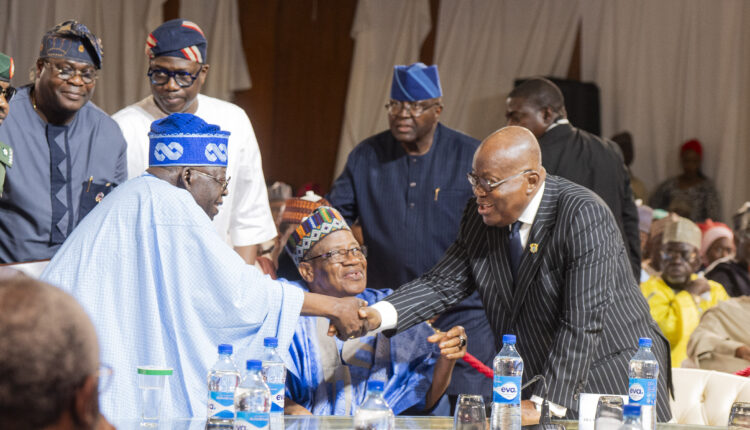Former President Nana Akufo-Addo has announced he is retiring from active partisan politics as a contended man comforted by the reality that Ghana’s multi-party democracy has come to stay and to grow- the very quest for which his entire adult life had been dedicated.
“I am happy as I leave active politics in my country, that the Ghanaian people appear to have imbibed deeply democratic values and culture to the extent that, in the thirty-three year existence of Ghana’s Fourth Republic, we have witnessed four peaceful transfers of power from one party to another through the ballot box in conditions that have not threatened the stability or unity of the State”, Akufo-Addo noted on Thursday February 20, 2025 in Abuja.
Nana Addo stated further: “It is a most comforting conclusion for someone who has devoted his life to the advancement and entrenchment of democracy in his country, even though the last such transfer a month ago, on 7th January 2025, was consequent upon a disastrous electoral performance by my party, the then ruling party, which led its presidential candidate to concede defeat even before the end of the formal collation and declaration of results. The silver lining in the party’s dark clouds was that the vote was clearly the expression of the sovereign will of the Ghanaian people. May such expressions long continue.”
Nana Akufo-Addo was speaking at the launch of the autobiography of former Nigerian military Head of State, General Ibrahim Badamasi Babangida, entailed ‘A Journey in Service.’
It was Nana Akufo-Addo’s first official trip outside his home country since he handed over power to John Mahama on January 7, 2025.
Akufo-Addo, in his address as the launch of Babangida’s memoir expressed concern that military takeovers seem to have become fashionable within the West African sub region in recent times- a development he described as worrying and one which needs some urgent attention because to him, the ballot box remain the best way to change governments.
“I feel a deep sense of disappointment that military coup d’etats have come back in fashion in our region, and are seen as the answer to the instability being spread from the Sahel by jihadist activity, and by some as the answer to difficult economic conditions, or unpopular government policies.
“It would appear that we have our work cut out for us all over again to try to build and consolidate the democratic structures in our countries to gain the confidence of our populations, especially to show that the road to prosperity would be faster and longer lasting when we are democratic,” Akufo-Addo noted.
He continued: “This book reminds us that if a civilian, constitutional government feels under constant threat of destabilization and having to spend far too much time and resources on security, a military government was under even more threat of insecurity.
“If the predictable problems of how to lift the bulk of the people from poverty and keep food prices down are overwhelming, they turn out to be far more tolerable when compared with the unpredictable things that hit a government in our part of the world.
“If it is a difficult and exhausting process to come up with a plausible and workable foreign policy for an African country today, it was a bigger nightmare at the time described in A Journey In Service.”
Nana Akufo-Addo told his audience about his personal experience as President of Ghana when Covid-19 struck and why he believes there is the urgent need for Africa to cooperate some more and become interdependent rather than rely on foreign aid:
“I am taking us to the beginning of the year, 2020, which was the last year of my first term in office. When I got the first draft of the speech to be delivered to Parliament, the working title my staff came up with was A NATION IN RUDE HEALTH.
“Let me assure you that these were not people who dealt in trivialities. They were not boasting, they were not tempting fate, A NATION IN RUDE HEALTH was a fair assessment of what things looked like in Ghana and the state of affairs at the beginning of the year 2020.
“All our economic indicators were pointing in the right direction, the Ghanaian people were full of optimism and had largely taken on board my Ghana Beyond Aid policy. It was a confident and good humoured president that delivered the Message on the State of the Nation that February day in Parliament.
“Within a matter of weeks from when this speech was delivered, a new word, COVID-19, entered our vocabulary and the world was brought to a thundering halt by a virus. I do not think I need to go into the details of the daily updates of the casualties around the world and the projections about how the streets of African cities would be filled with dead bodies.
“But I would remind all of us that the lessons, both immediate and long-term, that emerged from the Covid-19 crisis were harsh.
“The first was what we had always known but are often lulled into thinking could be different, which is that there is no such thing as charity in international relations. Nobody is going to give you some vaccine until their own needs have been fully satisfied. African countries need to cooperate with each other and not count on aid from the international community. That is why Senegal, Nigeria, South Africa, Rwanda, Ghana and others, have taken on the responsibility of manufacturing their own vaccines.”


Comments are closed.